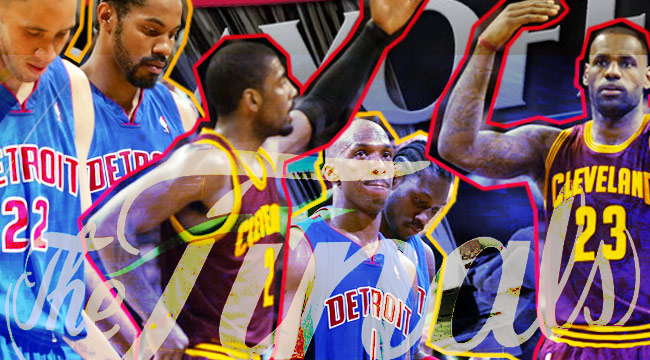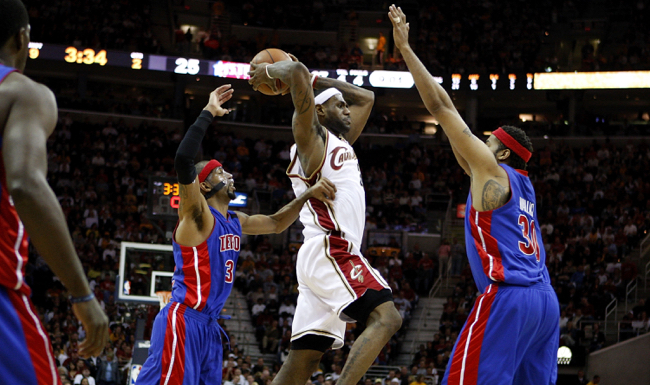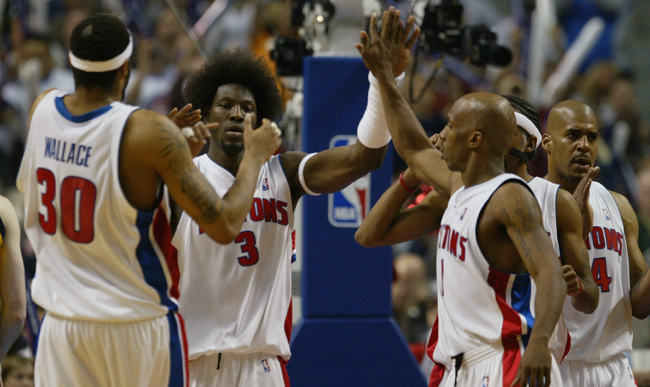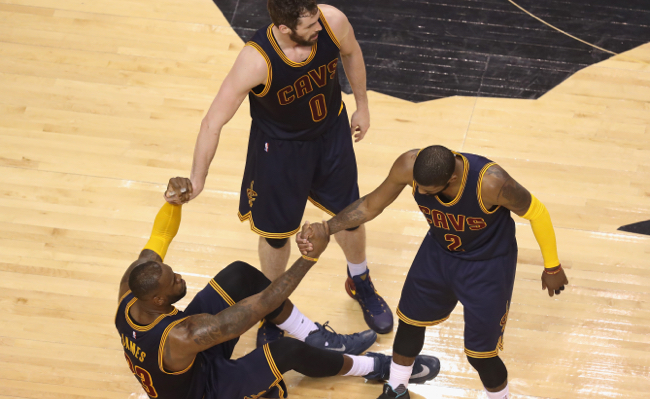
The NBA’s day-to-day doomsday scenarios continue with the 2016 NBA Finals. The Cavs have lost both games at Oracle to start the series, which in the contemporary Media Industrial Complex means they’ve lost the series. This mentality has happened a couple times in the Twitter Age, and each instance saw an overwhelming consensus giving the home team the series, despite the fact they had only defended homecourt, which they’re supposed to do as the higher seed. There are examples of this happening before, and one in particular the Cavs will want to think about before Wednesday night’s Game 3 in Cleveland.
The first Digital Age example comes in the 2012 Western Conference Finals between the Spurs and the Thunder. That season the Spurs Borg-like efficiency saw them win their last 10 regular-season games and their first 10 games of the playoffs, including their first two over the Thunder in San Antonio to start the Conference finals. Except, the athletic and ascending Thunder would take the next four straight on their way to their only Finals appearance, and the media got whiplash from switching directions while writing the narrative of that series.
Then there was first-round clash between the Grizzlies and Clippers in 2013. The Clippers won their first two games at home, as they should, and everyone had them pegged to take on the Thunder in the next round. It didn’t happen. L.A. lost both games back in Memphis and Game 5 back in Los Angeles. Memphis held homecourt in Game 6 their way to a 4-2 series win. On the bright side, the Clippers’ playoff meltdown meant Vinny Del Negro’s contract was not renewed.

Now we’ve got the Cavs facing a seemingly insurmountable 2-0 deficit in the Finals. And this is the point in the article where you jump to the comments and go ALL CAPS talking about how dominating the Warriors were in their two double-digit wins to start the series. And this is the point in the article where we hyperlink to this piece of flaming garbage that was actually sorta prescient (don’t you dare tell anyone) — at least through two games.
But, #hottake tug-of-war aside, there’s a team and a series the Cavs can look towards for inspiration as they face the tough task of climbing out of their 0-2 series hole with the flimsy digging tools of a poor-shooting LeBron James, matador-defending Kyrie Irving and concussed Kevin Love.
The reason you’re scratching your head right now is because only the people of Detroit, the people of San Antonio, and three other people worldwide, even watched the low-scoring June affair in 2005. This was back before the three-point arc became ground zero for the boring straw man against the ambiguously broad expression: analytics; back when post play still ruled and mid-range jumpers were the norm (i.e. Richard Hamilton was an All-Star); back when players were ostensibly “tougher,” or whatever revisionist history horse manure older fans ascribe to the NBA game before today (Yes, it pisses me off that all the people who say Steph and the Warriors would get their butts kicked by teams of yesteryear while simultaneously maligning the wide-open league of today didn’t even watch the NBA back in the early and mid-2000s).
The Spurs won Game 1 that year in dominating fashion: 84-69. Thankfully for the Pistons, that was their worst scoring output of the series, but the Spurs beat them down well enough in Game 2, as well, winning 97-76. A 15-point drubbing and a 21-point drubbing must’ve meant the series was over, right?
The Pistons were too tough for that, and the Cavs need to be the same. Tim Duncan and Manu Ginobili torched the Pistons in Game 1 and the then-floppy-haired Ginobili continued his torrid touch by scoring a team-high 27 points on just eight shots (he was 4-of-5 from deep and 11-of-13 from the charity line) in their Game 2 Pistons beatdown.

So how did Detroit respond in Game 3? By limiting Manu and Tim to a combined 21 points, and with Richard Hamilton and Chauncey Billups (the latter of whom was Detroit’s lone bright spot in Game 1) combining to score 44. Game 4 was more of the same, with the Pistons forcing Duncan and Tony Parker into a combined 11-of-30 shooting while rolling to a 102-71 blowout to even the series.
Yes, the Spurs won Game 5 and eventually Game 7 back in San Antonio, but the Pistons made them earn it by playing their butts off in the cozy confines of the Palace at Auburn Hills. The Cavs need that same mentality at the Q on Wednesday.
Plus, there are some things pointing in Cleveland’s favor as we come up on Game 3.
Kevin Love may not suit up. Yes, his 3-point shooting opens up the floor on the offensive side of the ball, and he’s an underrated passer and cutter, but he’s a sieve on defense, and when he’s on the floor, whichever big he’s matched up against is setting the high pick for Steph or Klay nearly every time down the floor. With him likely out for Game 4 as part of the NBA’s concussion policy, it could mean Iman Shumpert in the starting lineup, if they go small, Timofey Mozgov if they go big, and Channing Frye if they want some fake rim protection and a shooter out there similar to Love. But, again, Frye is almost as much of a defensive liability as Kevin, so his presence sorta negates that upside.
The Warriors don’t play as well on the road and the Cavs play better at home. There’s a reason the old play maxim holds: A series doesn’t start until a team loses at home. Well, through two games of the NBA Finals, that hasn’t happened yet. Need something empirical? The Cavs have shot better at home in the playoffs (49.6 percent from the field and 45.5 from three) then they have on the road (43.3 vs. 39.6). The Warriors shoot worse….

There’s more, too. As Tom Ziller at SB Nation pointed out, the Warriors have been a little worse on the road, especially coming down the stretch of the regular season. They were 10-3 on the road in the final two months, but their scoring margin of +1.4 was just the eight-best in the league (not exactly world beaters like their 73 total wins suggests).
That’s all well and good, but LeBron James is the real reason the Cavs should keep their heads up despite the series deficit. He’s still perhaps the finest basketball player in the world, and certainly the finest physical embodiment of that designation. The Warriors can throw a ton of bodies at him, but like he proved in Game 3 of last year’s Finals, he’s good enough to overcome even that cavalcade of long, fast defenders.
The Pistons didn’t win the 2005 Finals, but they made it an seven-game series, even if no one was watching. A lot of people are going to be watching on Wednesday, but let’s see if the Cavs can do the same.






